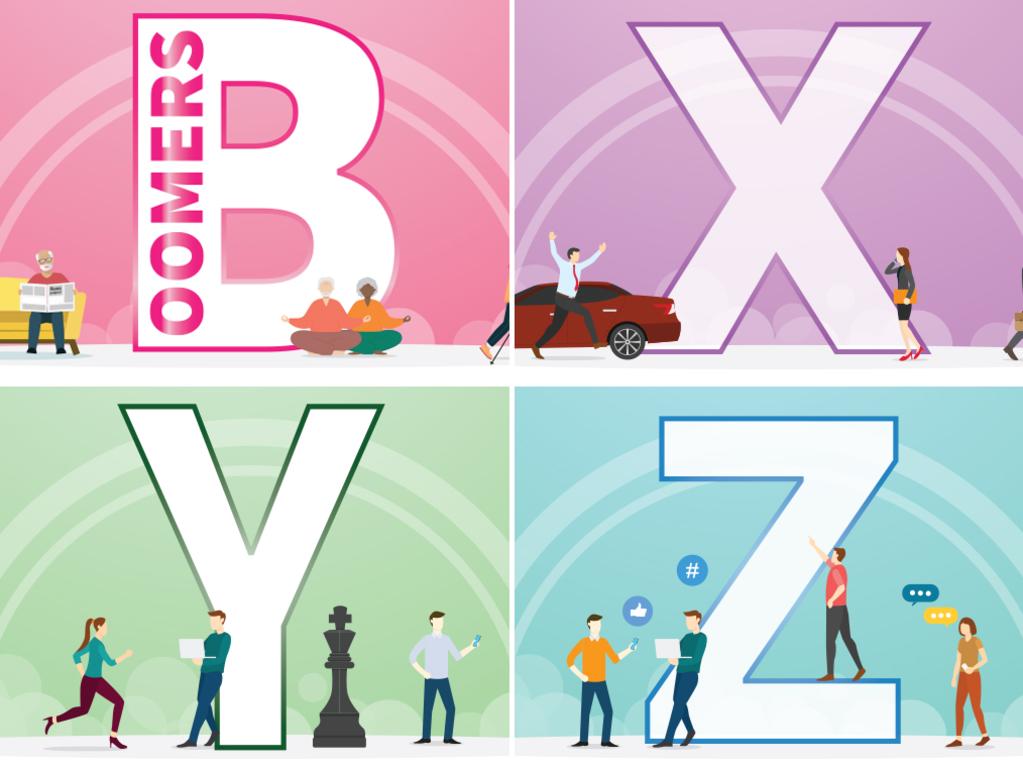People are often stereotyped based on what generation they belong to – younger cohorts are lazy, self-obsessed and entitled, older Aussies are conservative and close-minded.
From being branded “Karens” to being accused of prioritising buying smashed avocado over houses, the generational divide has ignited fierce debate over who had it easier.
So how do Victoria’s generations stack up? And who really is worse off?
Gen Y / Millennials (1980-1994)
The 30-somethings through to those in their mid-40s are considered the “demographic powerhouse” in Victoria. They’re the largest generation with a population of about 1.5 million.
“Gen Y were born at a time of record-high births, called the Echo Boom, because they’re the children of Baby Boomers,” social researcher Mark McCrindle said.
“High levels of migration have also added numbers to this generation.”
Gen Y are also fast emerging with earnings power. They are the most likely – along with those a bit older, Gen X – to be working full time (66 per cent). More than a quarter are earning an annual income above $91,000. They’ve also got a low unemployment rate, at 4 per cent.
But Gen Y aren’t doing so well on the housing side.
Mr McCrindle said while the generation might be high income rich, they are not asset rich.
“They have been left behind the property cycle, compared to both Gen X and Baby Boomers that went before,” he said.
They’re the most likely of all the generations to be renting (37 per cent), even though they’re among the highest-earning and the most educated.
Mr McCrindle said 45 per cent of Millennials have a university qualification, which also means they have high levels of student debt.
“They completed their education in the last decade or so where they paid full freight for their courses. It also moved from HECS to HELP and the student contribution became a bit more than it was,” he said.
Not only did the costs of university balloon to at least an average of $30,000 per course, but it also indexed, and it started to be countered by banks when looking at mortgage and capacity to pay.
“That was a result of a lot of the reforms around lending. So it didn’t come into the frame prior,” Mr McCrindle said.
“So it’s impacting the Gen Y’s in two ways. Firstly, because there’s serious debt that is compounding. And secondly, because it’s actually impacting that next stage of their life, being homeownership.”
The number of Gen Y Victorians who think they will never own a home increased from 29 per cent in 2021, to 42 per cent in 2023, Finder’s Consumer Sentiment Tracker of 1581 Victorians show.
About 11 per cent of Millennials are living with a mental health condition and have a life expectancy at birth of 75 for males and 81 for females.
Gen X (1965-1979)
It’s better news for those aged 45 to 59, who are considered to be at the “peak” in terms of their career development and earnings.
Even though Gen X’s don’t have the same level of education, with only one-in-three obtaining a university degree, they are the most likely to be working full time, have the lowest unemployment rate (3.7 per cent) and have the highest earnings of all of the generations with about a third earning over $91,000.
“They’re living in a pretty good place right now. They’re the peak point in life of career development, employment and earnings,” Mr McCrindle said.
“They got into property before it really accelerated as we see today. Just one in five of them are renting.”
Gen X, which make up more than 1,200,000 of Victoria’s population, also went through university before there was HECS debt, or just as it was coming in when indexation was a lot lower and cost per course was a fraction of what we see today.
This generation received discounts if they paid off their HECS upfront or early.
“Some of these discounts were between five and even up to 10 or 15 per cent at different points,” Mr McCrindle said.
Their life expectancy at birth was 70 for males and 77 for females.
Gen Z (1995-2009)
Gen Z’s, those aged 15 to just approaching their 30s, are shifting from learning to the early stages of life.
They’re likely to follow in the footsteps of those that went before and head off to get a tertiary qualification in record numbers.
“They might even be the first in Australia’s history where half of them end up with a university degree, with the other half most likely to have some form of post secondary education,” Mr McCrindle said.
This generation also has the highest unemployment rate, at more than 10 per cent.
Mr McCrindle said this is in part due to those who were in high school and university who suffered through the pandemic.
“They were in the important years of schooling or university when the pandemic struck, and many of them became disengaged in learning,” he said.
One in 10 of them are also living with a mental health condition.
“Normally, mental health onsets older people in life. It’s a bit of a challenge and probably something of the unique times that have shaped him,” Mr McCrindle said.
It’s twice as hard for Gen Z as their parents to own a home, when comparing income to the average cost of homes in Melbourne.
In the early ’80s when their parents were getting started in the property cycle, average incomes were a lot lower, around $16,000 a year, and the average detached home in Melbourne was just under $50,000.
Today, the average home price is just over $1 million, and the average annual income is $95,000.
Incomes have gone up six fold but property prices have gone up more than 20 fold.

“From three times your average annual income to 11 times – that just shows the uphill challenge that they face,” Mr McCrindle said.
Almost all of Gen Z (92 per cent) feel somewhat or extremely stressed about their finances, the highest of all generations, a 2024 Finder survey of 841 Victorians revealed.
On the positive side, Gen Z has the highest life expectancy at birth compared to the generations that went before, at 79 for males and 84 for females.
“They have educational assets, they have longevity benefits, and they’re just at the start of their economic life. So it’s yet to see how that’ll play out,” Mr McCrindle said.
Baby Boomers (1946-1964)
The Boomers are a sizeable generation as their name suggests, with more than 1,200,000 Victorians in their 60s and 70s.
About half of the generation live with a long-term health condition, including arthritis, asthma, diabetes, heart disease, cancer, dementia or mental health conditions.
“Health, given their life stage, is more of a challenge. Income and wealth is not,” Mr McCrindle said.
The generation makes up a fifth of Victoria’s population, but they own about half of the state’s private wealth.
“Their economic footprint is more than twice as large as their demographic footprint,” he said.
Boomers reported being the happiest generation (80 per cent) in a recent Victorian Finder survey. They also recorded having more than $62,000 stashed away in cash savings.
Builders (Before 1946)
Those aged 79 and older, the Builders, are considered to be the last generation that worked through life the “traditional way”.
“They worked throughout their life, then retired and lived on a pretty modest pension,” Mr McCrindle said.
“They are at the point where they’re living more frugally, they maybe have a house or they’re downsizing to aged care living.
“Every generation since has higher aspirations around the post working years, and also superannuation and other assets that they can call on to live out of. They’re more about lifestyle and travel.”
Gen Alpha (2010-2024)
The youngest generation, Gen Alpha, with the benefit of medical advances, has the highest life expectancy at birth with 81 for males and 85 for females.
“The ability to survive illnesses is growing and medical and pharmaceutical help is leading to longer life expectancy,” Mr McCrindle said.

“By the time this generation is into their 50s their life expectancy is expected to go beyond these projected years. They may even live as normal expectation well into their 90s, and many more than ever will become centenarians.”
He said while there are new possibilities for Gen Alpha, some of the financial challenges are likely to remain with them.
So which generation is better off?
Mr McCrindle said the Boomers and Gen X’s take the title as the best off generations.
“I think the Boomers did very well, but the Gen X’s are following in their footsteps and are also peaking in a lot of areas,” he said.
“I think they were the lucky generations. Millennials are beginning to arrive to the party a couple of hours late. But there’s definitely financial challenges that lie ahead for them and the younger generations.”

Head of consumer research at Finder Graham Cooke said student debt is a long-lasting factor that has had a big impact on the younger generations.
“Victorians have the highest student debt per student of any state in Australia, at $27,620 each,” he said.
Outstanding debt for Victorian students has risen to almost $22.2b for the 2022–23 financial year. This is up from $3.4b for the 2005–06 financial year and constitutes 28 per cent of the national debt total of $78.2b.
Victorian students had an average balance of $10,870 in 2005, which has more than doubled to $27,620 in 2022 – up 154 per cent in 17 years.
The average time it took students to repay their debt in full has jumped from 7 years in 2005 to almost 10 years in 2022.
A recent Finder survey revealed almost two in three Victorian students are slightly or extremely concerned about their ability to repay their loan. The research found almost one in 10 don’t think they’ll ever be able to repay their loan in full.


Inside the new generation of Melbourne gang feuds
Big personalities and competition for even bigger money are a complex and volatile mix, which has sparked conflict on the streets of Melbourne.
Could this be Melbourne’s next favourite summer sport?
One of India’s most popular sports looks set to be showcased in Melbourne’s sporting precinct around the same time as the Boxing Day test, with a major name rumoured to be organising the event.
Donvale mansion with its own hair salon ‘like a mini resort’
A lavish home on a block spanning more than 4000sq m, featuring everything from a cocktail room to a hair salon is up for sale. See what it might sell for.
High-flying Melbourne exec faces jail in France
A former student from St Kevin’s College will soon learn his fate after being accused of bashing his wife so badly she was left in a coma.
Victoria’s human rights charter influencing police stance on rallies
Victorian authorities may be taking a softer stance on protesters instead of upholding laws that could prevent October 7 related rallies, because of the state’s human rights charter.
Mum’s desperate pleas to free daughter from Hamas hell
It’s been 12 months since Naama Levy was kidnapped by Hamas terrorists, with her mother’s desperation to save her daughter reaching new heights.